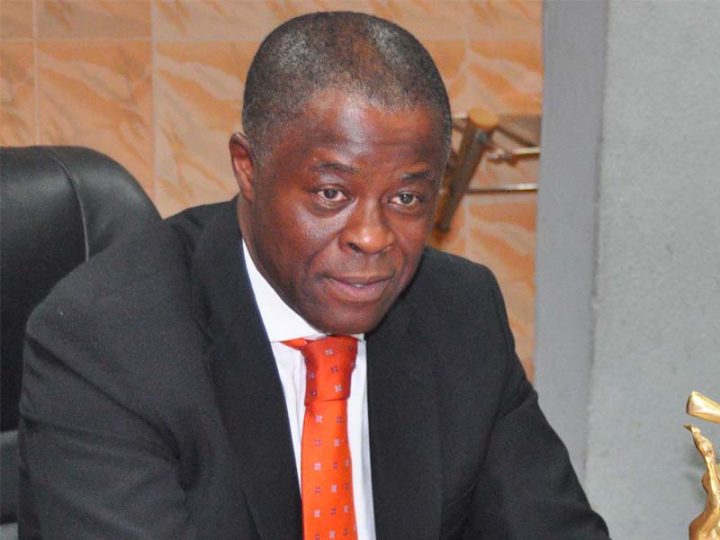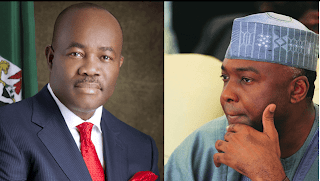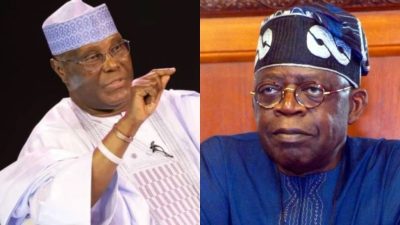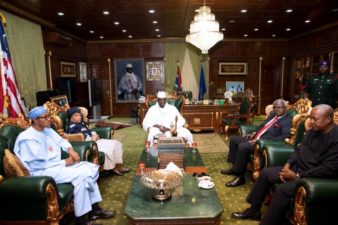An influential member of President Bola Ahmed Tinubu’s advisory board, Mr. Wale Edun, has said the country would unify its exchange rates “imminently”.
Edun, disclosed this to Bloomberg on Monday, after the country’s dollar debt surged following the surprise weekend suspension of the Central Bank of Nigeria (CBN) governor, Godwin Emefiele.
“I would say it would have to be done within a quarter as rather than within a year,” he said. “ I think you’re talking, think quarters rather than years, that’s where I would put it.”
Nigeria’s dollar debt surged after the surprise weekend ouster of Emefiele and as fresh comments on merging multiple exchange rates added to signs that Tinubu was resetting policies blamed for crippling Africa’s biggest economy.
Emefiele was suspended by Tinubu after the markets closed on Friday, and then detained by Nigeria’s state security service a day later for unexplained “investigative reasons.” Folashodun Shonubi, a deputy governor in charge of operations at the bank, took over in an acting capacity.
Just 15 days into the job, Tinubu has pulled the right levers for markets: ridding the country of a costly fuel subsidy, removing a controversial central bank governor, and promising to unify a web of varying exchange rates.
Foreign investors have embraced those decisions, sending Nigeria’s dollar debt surging on Monday. Tinubu set the tone in his inauguration speech on May 29, when he announced that the country’s gasoline subsidy was “gone” — a bold move that had set off riots when previous leaders attempted it.
“Overall, President Tinubu has shown that he’s willing to take on two of the most important factors investors are focusing on, which is fuel subsidies and FX reform, in a very short space of time,” said Thys Louw, a portfolio manager at Ninety One in London.
“Reform momentum in Nigeria has picked up considerably, although from a low level and sustaining this will be important given poor economic conditions Tinubu inherited.”
In two major moves, Tinubu suspended Emefiele on Friday, and yesterday, Edun, said it’d be a matter of months before he unified its exchange rates, a key demand of investors and multilateral institutions like the World Bank.
Nigeria’s international bonds due in 2029 jumped the most among emerging-market peers on Monday, a public holiday in Nigeria. Those notes jumped as much as 3 cents before closing around 88 cents on the dollar, the highest since January, according to data compiled by Bloomberg.
The extra yield investors demand to hold the nation’s debt over US Treasuries fell 38 basis points to 7.19 perctange points, according to a JPMorgan index.
The changes at the central bank “could spell the end of unorthodox and often conflicting and confusing monetary policies that held back economic growth and destroyed local and foreign investor confidence,” head of Africa sovereign and corporate credit research at BancTrust & Co. in London, Ayodeji Dawodu said.
Emefiele was widely seen as acting in lockstep with the administration of Tinubu’s predecessor, Muhammadu Buhari. That government was perceived to be more statist and socialist in its approach, said Yemi Kale, chief economist for Nigeria at KPMG LLP and the nation’s former statistician general. “The markets will respond positively to an administration it believes to be more market oriented,” Kale said.
A former governor of Lagos state, Tinubu has a colorful political history. He was the most powerful politician in Nigeria’s commercial hub and Africa’s biggest city. But he’s also been dogged by corruption allegations, which he denies.
In 1993, he forfeited $460,000 to resolve a lawsuit in Chicago after US authorities said that bank accounts in his name held the proceeds of heroin trafficking. More recently on the eve of the 2019 election, two armored bank vans were spotted entering his compound in Lagos. He denied using any money to purchase votes.
In his inaugural address Tinubu criticised the central bank and vowed to unify the multiple exchange rates in order to “direct funds away from arbitrage into meaningful investment in the plants, equipment and jobs that power the real economy.”
The current naira exchange rate of N471.92 to the dollar, a record low, likely needs to be adjusted to about N700-N750, closer to the current black-market rate, JPMorgan analysts said in an note on May 31.
A naira at that level, combined with Tinubu’s decision to remove a costly gasoline subsidy, “means the government does not have [to] borrow as much, just to pay interest on debt,” Charlie Robertson, head of strategy at FIM Partners, said in a series of posts on Twitter.
The naira has closed lower for three consecutive days, its longest streak of losses since May 12.
NBS: GDP Reached N173.52tn on Back of Improved Taxation in 2021
Meanwhile, Nigeria’s Gross Domestic Product (GDP) increased to N173.52 trillion in 2021, compared to N152.32 trillion in the preceding year on the back of improved taxation.
Precisely, tax revenues improved to N18.85 trillion from N12.79 trillion in 2020, according to the National Bureau of Statistics (NBS). The revenues comprised N2.14 trillion in oil taxes in 2021 from N1.51 trillion in 2020.
Also, non-oil taxes improved to N16.70 trillion in 2021 compared to N11.14 trillion in the preceding year.
According to the Revised Data on Tax-to-GDP Ratio, which was posted on its website, the improvement in tax generation helped to push the country’s tax to GDP to 10.86 per cent in 2021 from 8.40 per cent in 2020.
According to the NBS, the Federal Inland Revenue Service (FIRS) had initiated a review of the tax to GDP ratio in Nigeria using revised data.
It stated that the collaborative effort between the revenue service, the Federal Ministry of Finance, and the bureau was made for better measurement of the tax-to-GDP ratio for Nigeria.
The new figures were revised and updated to reflect better data sources and improved estimation using the Organisation for Economic Co-operation and Development (OECD) manual.
The OECD manual is an improvement over the System of National Accounts (SNA 2008) classification of taxes.
The NBS noted that although the System of National Accounts conceptual framework and its definitions of the various sectors of the economy are reflected in the OECD’s classification of taxes, the OECD classifications provide the maximum disaggregation of statistical data on what are generally regarded as taxes by tax administrations.
It said the revised computation took into account wider coverage of data at the federal, state, and local government levels, and revenue items not previously included in the computations, particularly, relevant revenue collected by other agencies of government.
Separately, the NBS disclosed that a total of 27.5 million Nigerians were registered and issued their National Identity Numbers (NIN) by the National Identity Management Commission (NIMC) in 2021.
This indicated a rapid growth of 439.12 per cent from the 5.02 million issued in the preceding year.
The total number of registration and NIN issued in 2019 was 5.84 million.
According to the National Identity Registration Statistics released by the National Bureau of Statistics (NBS), the data is presented by gender, state where the registration and identity number was issued, as well as by geo-political zones, and covered 2019 and 2021.
Of the 2019 estimate, 42.41 per cent represented females while 57.59 per cent were males.
In 2020, female registration accounted for 45.23 per cent of total figure, while male registration accounted for 54.77 per cent.
In 2021, female registration accounted for 47.41 per cent, while 52.59 per cent represented males registration, according to the statistical agency.
An analysis by state indicated that Kaduna State recorded the highest number of registration and national identity number issued in 2019 with 595,284.
This was followed by Lagos and Kano with 560,757, and 485,912 respectively.
However, in 2020, Lagos recorded the highest number of registration and national identity number issued with 523,901, followed by Kaduna with 471,858, and Kano with 373,352.
In 2021, Kano recorded the highest with 3,415,421, followed by Lagos with 3,002,693, and Kaduna with 1,434,331.
In addition, analysis by geo-political zone showed that for the three-year period, the North-West recorded the highest number of registration and national identity number issued with 1,786,469, 1,516,089, and 8,690,903 in 2019, 2020, and 2021 respectively, while the South-East had the lowest number of registration and national identity number issued with 414,089, 360,332 and 1,601,481 respectively. ARISE NEWS




